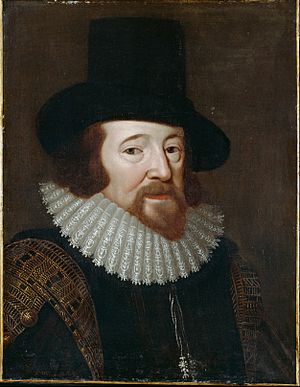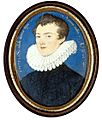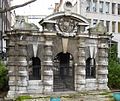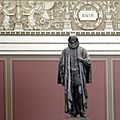Francis Bacon facts for kids
Quick facts for kids
The Viscount St Alban
|
|
|---|---|

Portrait by Paul van Somer I, 1617
|
|
| Lord High Chancellor of England | |
| In office 7 March 1617 – 3 May 1621 |
|
| Monarch | James I |
| Preceded by | Sir Thomas Egerton |
| Succeeded by | John Williams |
| Attorney General of England and Wales | |
| In office 26 October 1613 – 7 March 1617 |
|
| Monarch | James I |
| Preceded by | Sir Henry Hobart |
| Succeeded by | Sir Henry Yelverton |
| Personal details | |
| Born |
Francis Bacon
22 January 1561 The Strand, London, England |
| Died | 9 April 1626 (aged 65) Highgate, Middlesex, England |
| Resting place | St Michael's Church, St Albans |
| Spouse | |
| Parents |
|
| Education | Trinity College, Cambridge (no degree) Gray's Inn (call to bar) |
| Notable works | Works by Francis Bacon |
| Signature | |
|
Philosophy career |
|
| Other names | Lord Verulam |
|
Notable work
|
Novum Organum |
| Era |
|
| Region | Western philosophy |
| School | Empiricism |
|
Main interests
|
|
|
Notable ideas
|
List
|
|
Influenced
|
|
Francis Bacon, also known as Lord Verulam, was an important English thinker and politician. He was born on January 22, 1561, and died on April 9, 1626. He served as the Attorney General and later as the Lord Chancellor of England.
Bacon is famous for helping to develop the scientific method. He believed that to understand the world, scientists should observe things carefully and use inductive reasoning. This means drawing general conclusions from specific observations. He thought that science should be done in a careful and questioning way to avoid making mistakes.
He is often called the "father of empiricism". This idea suggests that all knowledge comes from experience and observation. Even though some of his specific ideas about the scientific method, called the Baconian method, didn't last, his general idea that a careful way of thinking is important for science is still used today.
Bacon also loved books and libraries. He created a system to organize books into three main groups: history, poetry, and philosophy. He famously wrote, "Some books are to be tasted; others swallowed; and some few to be chewed and digested." This means some books are for quick reading, some for understanding, and a few for deep thought.
Some people believe that Francis Bacon might have written some or all of the plays usually credited to William Shakespeare. This is known as the Shakespearean authorship thesis.
Bacon studied at Trinity College, Cambridge when he was young. Later, Elizabeth I made him her legal advisor. When James I became king, Bacon was knighted. He was given the title Baron Verulam in 1618 and Viscount St Alban in 1621. He didn't have any children, so his titles ended when he died in 1626 at age 65. He died from pneumonia. One story says he got sick while experimenting with freezing meat to preserve it. He is buried at St Michael's Church, St Albans.
Contents
Francis Bacon's Life Story
Early Years and Education
Francis Bacon was born on January 22, 1561, in London. His father, Sir Nicholas Bacon, was an important government official. His mother, Anne (Cooke) Bacon, came from a family of educated people.
Because he was often sick as a child, Bacon was taught at home. He later went to Trinity College, Cambridge at age 12. He studied there for three years with his older brother, Anthony. At Cambridge, he met Elizabeth I, who was impressed by how smart he was. She even called him "The young lord keeper."
His studies made him think that the way science was done back then was wrong. He respected Aristotle, a famous ancient Greek philosopher, but he didn't like the way people used Aristotle's ideas in his time. He felt it wasn't leading to new discoveries.
In 1576, he started studying law at Gray's Inn. A few months later, he traveled to France with the English ambassador. For the next three years, he visited different countries like Italy and Spain. During his travels, he learned about languages, government, and law.
In 1579, his father suddenly died. His father had planned to buy land for Francis, but he died before he could. This left Francis with little money, and he got into debt. To support himself, he continued his law studies at Gray's Inn.
Becoming a Parliament Member
Bacon had three main goals in life: to find truth, to serve his country, and to serve his church. He wanted an important job to help him achieve these goals. In 1580, he tried to get a job at the royal court, but it didn't work out. For two years, he worked quietly at Gray's Inn, becoming a lawyer in 1582.
His political career began in 1581 when he was elected to Parliament. He represented different areas over the years. He started writing about the church and how to improve philosophy. He also showed some support for a group called the Puritans.
Around this time, he asked his powerful uncle, Lord Burghley, for help. After this, his law career moved quickly. He became a senior lawyer in 1586. In 1589, he got a valuable job as Clerk of the Star Chamber, which paid well, though he didn't officially start until 1608.
He became known as a reformer who wanted to make laws simpler. Even though he supported the Queen, he was against old feudal privileges and too much power for the king. He also spoke against punishing people for their religious beliefs. He supported the idea of uniting England and Scotland, which helped create the United Kingdom. He believed closer ties would bring more peace and strength.
Working for the Queen
Bacon soon became friends with Robert Devereux, the 2nd Earl of Essex, who was a favorite of Queen Elizabeth. By 1591, Bacon was the Earl's trusted advisor.
In 1594, the job of Attorney General became open. Even with the Earl of Essex's help, Bacon didn't get the job. It went to Sir Edward Coke, who became Bacon's rival. Bacon also failed to get the job of Solicitor General in 1595. To make him feel better, Essex gave him some property.
In 1597, Queen Elizabeth made Bacon her official legal counsel. His standing with the Queen improved, especially after he stopped being so close to Essex. This was a smart move, as Essex was later executed for treason in 1601. Bacon was part of the legal team that investigated the charges against Essex.
Rise to Power Under King James I
When James I became king in 1603, Bacon gained more favor. He was knighted that year. In 1604, he married Alice Barnham. In 1607, he finally became the Solicitor General, and in 1608, he started his job as Clerk of the Star Chamber.
Even with a good income, Bacon still had old debts. He wanted more important jobs and wealth, so he supported King James. In 1613, Bacon was made Attorney General. He worked hard in this role.
Bacon continued to use his influence with the king to help solve problems between the king and Parliament. Because of this, he was made Lord Chancellor in 1618, which was a very high position. On July 12, 1618, the king made him Baron Verulam. Then, on January 27, 1621, he was made Viscount St Alban.
His Public Disgrace
Bacon's public career ended sadly in 1621. He had fallen into debt, and a committee from Parliament accused him of accepting gifts while he was a judge. His old rival, Sir Edward Coke, was involved in these accusations.
Bacon admitted that he had accepted gifts, but he said that these gifts never changed his decisions in court. He was sentenced to a large fine and sent to the Tower of London. However, his imprisonment only lasted a few days, and the king forgave his fine. More seriously, Parliament said Bacon could not hold any future public office or sit in Parliament. After this, he spent his time studying and writing.
Personal Life
Religious Beliefs
Francis Bacon was a strong Anglican (a type of Christian). He believed that we should study philosophy and the natural world by observing them. But he also thought that we could only learn about God's existence through reason. To understand God's nature and purposes, he believed we needed special revelation, like from religious texts.
Bacon also thought that knowledge should grow and build on itself, not just preserve the past. He wrote, "Knowledge is the rich storehouse for the glory of the Creator and the relief of man's estate." This means knowledge helps us understand God's creation and improve human life. He also said that "a little philosophy inclineth man's mind to atheism, but depth in philosophy bringeth men's minds about to religion." This suggests that a little bit of knowledge might make someone doubt God, but deeper understanding brings them back to faith.
Marriage
At age 45, Bacon married Alice Barnham, who was 13 years old. She was the daughter of a well-known London official. Bacon wrote two poems showing his love for Alice. When Bacon became Lord Chancellor, Lady Bacon was given a high rank among other ladies at court.
Bacon's personal secretary, William Rawley, wrote that their marriage had "much conjugal love and respect." He mentioned a special robe Bacon gave Alice, which she wore for many years, even after his death. However, there were also stories that their marriage had problems, possibly because Alice had less money than she was used to. Bacon later changed his will and left her nothing.
Death
Francis Bacon died on April 9, 1626, from pneumonia at a house outside London. A famous story by John Aubrey says that Bacon got sick while experimenting with freezing a chicken with snow to see if it would preserve meat.
He was buried in St Michael's Church, St Albans. After his death, many important thinkers wrote tributes to him. He left behind some money and land, but he also had many debts.
Bacon's Ideas and Writings
Francis Bacon's ideas are found in his many writings. These can be grouped into three main areas:
- Scientific works: These show his ideas for changing how we gain knowledge and improve human life using the scientific method.
- Religious and literary works: These include his thoughts on morals and religion.
- Legal works: These propose his ideas for improving English law.
Bacon's Impact and Legacy
Science
Bacon's important book, Novum Organum, was very influential in the 1600s. It laid out the basics of the scientific method, focusing on observation and induction.
Bacon believed that all learning and knowledge come from inductive reasoning. He thought that by carefully observing specific things in nature, we could gather information. Then, by organizing this information, we could understand nature better and draw general conclusions. He said, "Experimentation is essential to discovering the truths of Nature." This means doing experiments helps us find out how the world really works.
Bacon saw nature as very complex, and he believed that scientists needed to work hard to uncover its secrets. He thought that by taking specific examples from nature and expanding them into general ideas, we could gain new knowledge. He believed that understanding small parts of nature helps us understand nature as a whole.
During the 1700s, in the French Enlightenment, Bacon's way of looking at science became more important than the ideas of Descartes. Voltaire, a famous French writer, called Bacon the "father" of the scientific method. Bacon is also known as the "Father of Experimental Philosophy."
He also wrote a long book about medicine called History of Life and Death, which included observations on how to live longer.
One of his biographers, William Hepworth Dixon, said that Bacon's influence is so great that anyone who uses a train, sends a telegram, or enjoys a good garden owes him something.
North America
Bacon played a big part in setting up British colonies in North America, especially in Virginia, the Carolinas, and Newfoundland in Canada. His report on "The Virginia Colony" was submitted in 1609. In 1610, Bacon and his friends received permission from the king to form a company to start a colony in Newfoundland.
Thomas Jefferson, the third President of the United States, greatly admired Bacon. He wrote, "Bacon, Locke and Newton. I consider them as the three greatest men that have ever lived."
In 1910, Newfoundland even put Bacon on a postage stamp to honor his role in starting the colony. The stamp called him "the guiding spirit in Colonization Schemes in 1610." Some experts also believe he helped write important rules for the Virginia Colony.
Law
Even though few of Bacon's ideas for law reform were used during his lifetime, his legal work has had a lasting impact. Some people believe it influenced the Napoleonic Code, a famous set of laws in France.
Bacon is credited with helping to create important parts of the modern common law system. This includes using past court cases to understand unwritten laws and using logic to decide which past cases are important for new situations. He also helped shape the idea of lawyers presenting opposing arguments in court.
Bacon is honored with a statue at Gray's Inn in London, where he studied law.
Organizing Knowledge
Francis Bacon believed that knowledge should be organized in a way that everyone could access it. He thought that if people had better access to education, humanity would improve. His ideas changed how people in the Western world thought about knowledge, moving it from something individual to something that benefits society.
Bacon's original way of classifying knowledge put everything into three main groups: history, poetry, and philosophy. He based this on how he thought the human mind processes information: through memory, imagination, and reason. His careful way of organizing knowledge goes hand-in-hand with his scientific methods. Bacon's writings were even used as a starting point for library classification systems in the United States in the 1800s.
The famous saying "knowledge is power" is often linked to Bacon. He wrote something similar in Latin: "ipsa scientia potestas est," which means "knowledge itself is power."
Historical Discussions
Bacon and Shakespeare
Some people believe that Francis Bacon wrote some or all of the plays that are usually said to be by William Shakespeare. This idea, called the Baconian hypothesis, first appeared in the mid-1800s.
Mysterious Theories
Francis Bacon often met with friends at Gray's Inn to talk about politics and philosophy. He also tried out short plays he had written. Some authors and scholars have discussed whether Bacon had connections to groups like the Rosicrucians and Freemasons. However, others say there isn't strong proof for these claims.
Some historians suggest that Bacon's ideas for advancing learning were connected to the German Rosicrucian movement. Bacon's book New Atlantis describes a land ruled by people who seem like Rosicrucians. He may have seen his own efforts to advance knowledge as fitting with Rosicrucian ideals.
Another link is the similarity between Bacon's New Atlantis and a German Rosicrucian book called Description of the Republic of Christianopolis. Both describe ideal islands where science and spiritual ideas are important, and where people aim for intellectual and spiritual growth. They also show great advances in technology, similar to Bacon's ideas about scientific methods.
While rejecting conspiracy theories, some historians argue that Bacon was familiar with old magical texts. They suggest that Bacon's ideas about applying science had roots in Renaissance ideas about how magic could help humans control nature. However, these historians also say that Bacon eventually moved away from the philosophical ideas of magic as he developed his modern scientific approach.
Some groups, like the AMORC, even claim that Bacon was a leader of the Rosicrucian Order in England and Europe during his lifetime.
Images for kids
-
Bacon's statue at Gray's Inn in London.
-
Memorial to Bacon in the chapel of Trinity College, Cambridge.
-
An old picture of Alice Barnham.
-
Monument to Bacon at his burial place in St Michael's Church, St Albans.
-
Statue of Bacon in the Library of Congress in Washington, D.C..
-
Painting of the front cover of The History of Royal-Society of London, showing Bacon (right) as an influence on the Royal Society.
-
A Newfoundland stamp, which reads: "Lord Bacon – the guiding spirit in colonization scheme".
See also
 In Spanish: Francis Bacon para niños
In Spanish: Francis Bacon para niños
- Cestui que (defence and comment on Chudleigh's Case)
- Romanticism and Bacon
- Scientia potentia est
- Works by Francis Bacon















